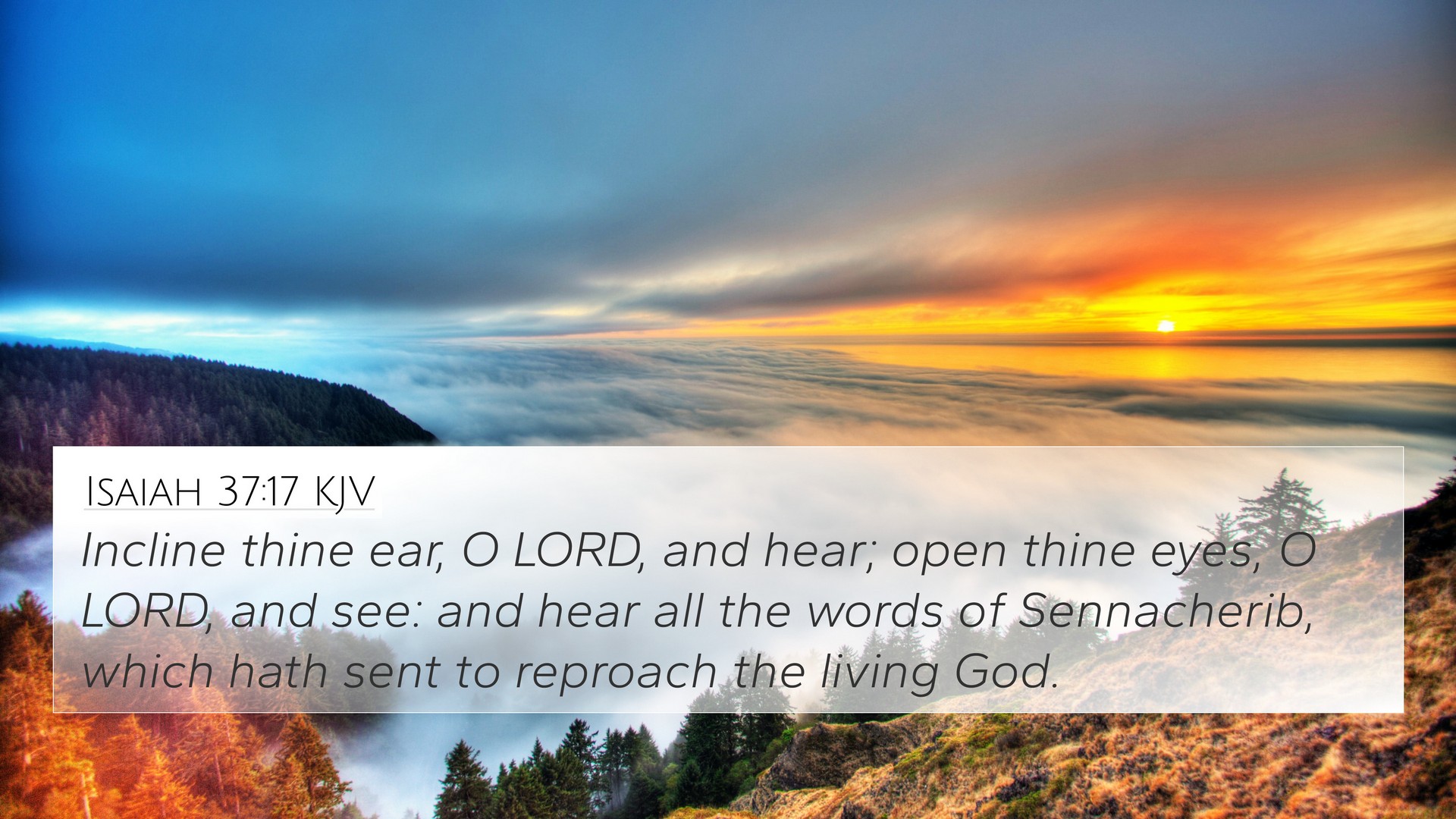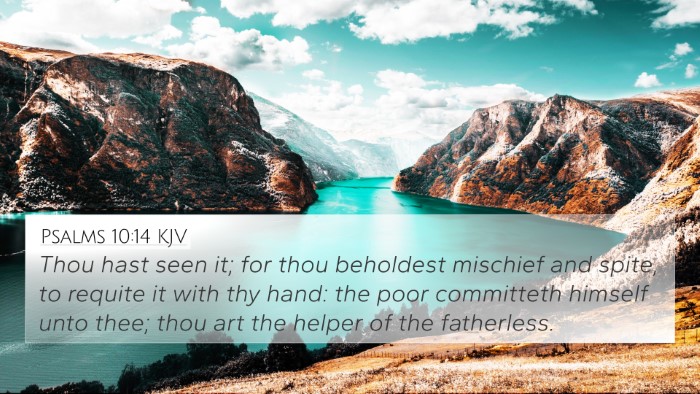Understanding Isaiah 37:17
Isaiah 37:17 reads:
"Incline your ear, O LORD, and hear; open your eyes, O LORD, and see; and hear all the words of Sennacherib, which he has sent to reproach the living God."
This verse is a heartfelt plea made by King Hezekiah of Judah as he addresses God concerning the threats posed by Sennacherib, the king of Assyria. The plea reflects an urgent need for divine intervention in a time of distress.
Summary of Insights from Public Domain Commentaries
Matthew Henry's Commentary
According to Matthew Henry, this verse serves as a fervent supplication to God, beseeching Him to listen and acknowledge the dire circumstances faced by His people. He notes that Hezekiah’s approach underscores the importance of prayer, especially in moments of overwhelming adversity. Henry emphasizes that Hezekiah recognizes Sennacherib’s words as a direct challenge against God Himself, highlighting the nature of spiritual warfare and the necessity for believers to seek God’s attention in their times of need.
Albert Barnes' Notes on the Bible
Albert Barnes expounds on the phrase "Incline your ear," suggesting that it represents a longing for God’s attentiveness. He interprets this request as an acknowledgment that God’s focus is crucial in addressing the threats from Sennacherib, whose arrogance and blasphemies threaten God’s honor. Barnes highlights the significance of asking God to see the plight of His people, reinforcing the theme of divine empathy. He connects this plea to the overarching narrative of reliance on God amidst national and personal crises.
Adam Clarke’s Commentary
Adam Clarke interprets this verse as an illustration of a sincere cry for help. He explains that Hezekiah was not merely seeking divine intervention for political reasons but rather recognizing the theological implications of Sennacherib's actions as acts of reproach against the God of Israel. Clarke emphasizes the necessity of both divine hearing and sight, underscoring a holistic understanding of God’s involvement in the affairs of men.
Cross-Referencing Biblical Texts
Cross-referencing is vital to understanding this verse more deeply. Below are key Bible verses that relate to Isaiah 37:17, highlighting the interconnections between scripture and the thematic elements of trust in God during trials:
- 2 Kings 19:15-16: Hezekiah’s prayer echoes similar sentiments as he acknowledges God's sovereignty and pleads for assistance.
- Psalm 61:1-2: A parallel prayer for God’s attention and protection resonates with Hezekiah's plea.
- Isaiah 37:14: Hezekiah’s actions of presenting the Assyrian letter to God reinforce his reliance on divine power.
- Jeremiah 33:3: "Call unto me, and I will answer you," reflecting God’s promise to respond to prayers for help.
- Psalm 46:1: Assurances of God being a refuge and strength connect to Hezekiah's request for divine support.
- Matthew 7:7: "Ask, and it will be given to you," illustrates the principle of seeking God's attention through prayer.
- Philippians 4:6-7: Encouragement to present our requests to God aligns with the heart of Hezekiah's cry.
- 1 Peter 5:7: Casting all your anxieties on Him reinforces the concept of laying burdens before the Lord.
- Isaiah 63:9: “In all their affliction He was afflicted,” shows God's empathy towards His people, akin to Hezekiah's request for His attentiveness.
- Romans 8:31: "If God is for us, who can be against us?" provides theological reassurance against adversaries.
Thematic Connections and Implications
Isaiah 37:17 serves as a profound reminder of the Jewish belief in the living God, especially in contrast to the worship of lifeless idols. Hezekiah's invocation illustrates a deep relationship where he relies on God’s intervention, showcasing a continual theme throughout the Bible of God responding to the cries of His people.
Moreover, this verse embodies the importance of understanding the dynamics of prayer and the power of God to act in response to it. The theme of divine attentiveness runs through various scriptures, encouraging believers to approach God in faith, particularly during crises.
Using Cross-References in Study
For those seeking to engage in a cross-reference Bible study, this verse opens avenues for deeper exploration of related scriptures. Here are some tools for Bible cross-referencing:
- Bible Concordance: A comprehensive index that helps locate words and their corresponding scriptures.
- Bible Cross-Reference Guide: A resource that provides thematic links between various scriptures.
- How to Use Bible Cross-References: Familiarizing oneself with systematic methods for identifying scriptural connections.
- Bible Chain References: Following a series of linked verses that illuminate a particular theme or concept.
- Comprehensive Bible Cross-Reference Materials: Utilizing study Bibles or reference books that include cross-references to deepen understanding.
Conclusion
Isaiah 37:17 is an exemplary verse that encapsulates the essence of prayer, faith, and the plea for divine intervention. It invites believers into a rich dialogue with God, affirming that in times of dire need, turning to Him in prayer is of utmost importance. By engaging in comparative Bible verse analysis and exploring connections between Bible verses, we can deepen our understanding of God’s nature and His willingness to act on behalf of those who earnestly seek Him.
















